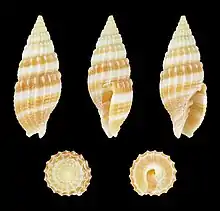Vexillum amandum
Vexillum amandum, common name: the Amanda mitre or the beloved mitre, is a species of small sea snail, marine gastropod mollusk in the family Costellariidae, the ribbed miters.[1]
| Vexillum amandum | |
|---|---|
 | |
| Scientific classification | |
| Domain: | Eukaryota |
| Kingdom: | Animalia |
| Phylum: | Mollusca |
| Class: | Gastropoda |
| Subclass: | Caenogastropoda |
| Order: | Neogastropoda |
| Family: | Costellariidae |
| Genus: | Vexillum |
| Species: | V. amandum |
| Binomial name | |
| Vexillum amandum (Reeve, 1845) | |
| Synonyms | |
| |
Description
The shell size varies between 8 mm and 20 mm
(Original description) The shell is somewhat pyramidal. The spire is sharply turreted. The whorls are longitudinally closely ribbed, transversely impressed. They are encircled throughout with narrow white and reddish brown bands. The columella is four-plaited. [2]
(Described as Vexillum (Costellaria) malcolmensis ) The shell is variable both in sculpture and colouring, though not so in form. This little species, evidently abundant in certain favoured localities, differs in the number of longitudinal ribs, some specimens having half as many again on the body whorl as have others. The rufous banding is also entirely absent in specimens dredged from any depth. Occasionally, too, examples with the body whorl almost wholly rufous brown turn up. Perhaps the nearest ally to this is Vexillum scitulum (A. Adams, 1853); the body- whorl is not so attenuate basally. Vexillum discolorium (Reeve, 1845) is hardly comparable, though a little similar in coloration. Vexillum fidicula (Gould, 1850) is far more scalate. Vexillum mica (Reeve, 1845), from Island of Guimaras, which is only known from a figure, is more like in form but of different pattern; and Vexillum caelatum (Reeve, 1845) has whorls angular above and the outer lip more flexuous. It is likewise comparable to Vexillum delicatum (A. Adams, 1853)
The type is twice banded with rufous brown spirally at the interstices between the ribs. The var. immaculata, a white or pale yellow almost unhanded variety, is found at 10-50 fathoms. [3]
Distribution
This species occurs in the Red Sea, in the Indian Ocean off Mozambique, in the Pacific Ocean off the Philippines and Eastern Australia
References
- Vexillum amandum (Reeve, 1845). Retrieved through: World Register of Marine Species on 5 April 2012.
- Reeve, L. A. (1844-1845). Monograph of the genus Mitra. In: Conchologia Iconica, or, illustrations of the shells of molluscous animals, vol. 2, pl. 1-39 and unpaginated text. L. Reeve & Co., London.
- Melvill & Standen (1901) Mollusks from the Persian Gulf and Arabian Sea; Proceedings of the Zoological Society of London. v. 2, 1901
- Schepman, M.M. 1911. The Prosobranchia of the Siboga Expedition. Part 4: Rhachiglossa. pp. 247-364, pls 18-24 in Weber, M. (ed.). Siboga Expeditie. Monograph 49.
- Sowerby, G.B. (3rd) 1913. Descriptions of new species of Mollusca. Annals and Magazine of Natural History 8 12: 233–239
- Cernohorsky, W.O. 1970. Systematics of the families Mitridae & Volutomitridae (Mollusca: Gastropoda). Bulletin of the Auckland Institute and Museum. Auckland, New Zealand 8: 1-190
- Cernohorsky, W.O. 1978. Tropical Pacific marine shells. Sydney : Pacific Publications 352 pp., 68 pls.
- Wilson, B. 1994. Australian marine shells. Prosobranch gastropods. Kallaroo, WA : Odyssey Publishing Vol. 2 370 pp.
- Salisbury, R.A. 1999. Costellariidae of the World, Pt. 1. Of Sea and Shore 22(3): 124-136
- Turner H. 2001. Katalog der Familie Costellariidae Macdonald, 1860. Conchbooks. 1–100 page(s): 16
- Arnaud, J.P., Berthault, C., Jeanpierre, R., Martin, J.C. & Martin, P. 2002. Costellariidae et Mitridae de Nouvelle Calédonie. Xenophora. Association française de conchyliologie. Supplément 100: 52 pp.
- Thach, N.N. 2002. The miters of Vietnam. Of Sea and Shore 25(1): 40-51
- Wils, E. & Verbinnen, G. 2002. Red Sea Mollusca: Part 12. Class Gastropoda; Family: Costellariidae. Gloria Maris 41(1-2): 29-37 [
External links
- Cernohorsky, Walter Oliver. The Mitridae of Fiji; The veliger vol. 8 (1965)
- Ladd, H.S. (1977). Cenozoic fossil mollusks from western Pacific islands; Gastropods (Eratoidae through Harpidae). U.S. Geological Survey Professional Paper. 533: i–iv, 1–84, pls 1–23
 This article incorporates text from this source, which is in the public domain.
This article incorporates text from this source, which is in the public domain.